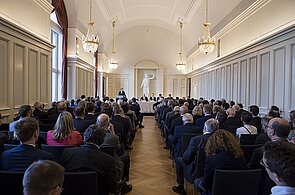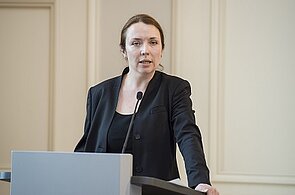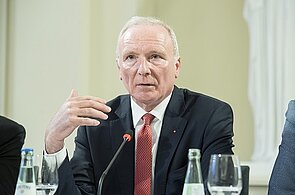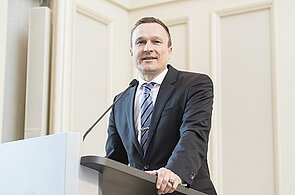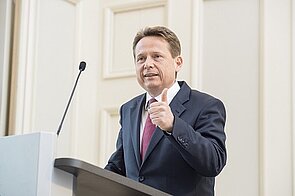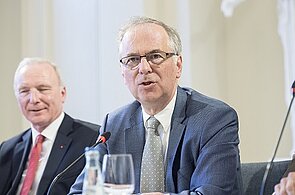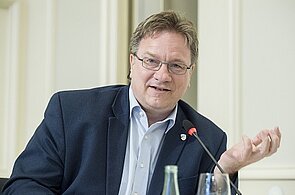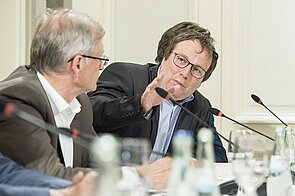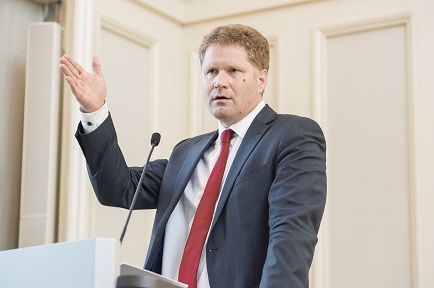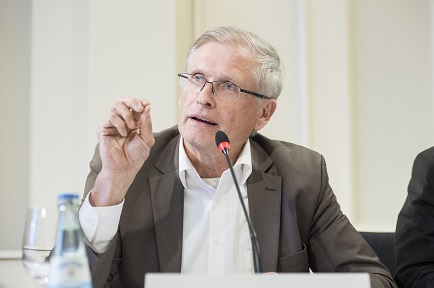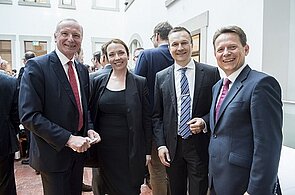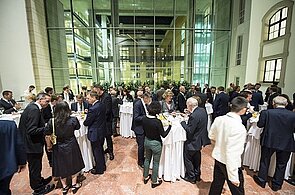Investment security, carbon pricing and data protection for the industry 2030: Parliamentary evening taking a holistic approach
As BBH partner Prof. Dr. Ines Zenke pointed out in her welcoming words at the parliamentary evening in Berlin on 23/04/2018, the term “digitalisation” appears 71 times in the Coalition Agreement. More than 220 representatives from politics as well as the industrial and the energy sector had gathered in the recently renovated Kaisersaal of the German Parliamentary Society to discuss the challenges of the digital and energy transition. But where does this digital transformation lead and how can the necessary planning security be achieved? There is (too) little information on these aspects in the Coalition Agreement. As Prof. Dr. Ines Zenke put it: “Legal certainty and security of investment must once again be a matter of course. Those who perform a legal task must be able to generate an adequate return. And those who follow a statutorily desired incentive must not be left with a stranded investment shortly afterwards.”
Likewise, Member of the Bundestag Bernd Westphal (SPD) under whose auspices the parliamentary evening was held, stated: “Good economic policy lays down reliable guidelines.” With this statement, he made clear that it is the task of the new Federal Government to set the framework conditions ensuring planning security for the industry. At the same time, however, he stressed the social responsibility and social acceptance that are important in the context of the digital and energy transition.
‘Industry 2030’ was the title of the parliamentary evening: And with the aluminium producer TRIMET, a large-scale consumer with a huge appetite for electricity was invited to join the panel: 1.3% of the annual electricity demand in Germany is necessary for TRIMET to produce and supply aluminium. For Dr. Martin Iffert, Chief Executive Officer of TRIMET, focussing only on consumption, however, does not go far enough. According to him, more and more aluminium smelters are being converted into virtual electricity storage facilities, thus playing a vital role in the energy system and ensuring grid stability. His aspiration for the German industry is to “always think one step ahead.” He sees the industry’s role in shaping the digital and energy transition.
At least as far as the digital transformation is concerned, there is indeed still much room for improvement: According to the Digital Economy and Society Index (DESI), Germany is ranked 11th in Europe. Dr. Ralph Müller, member of the executive board of Deutsche Postbank, interprets the result as a mission: According to him, Germany must catch up in this area in the next few years. “Small and medium-sized enterprises (SMEs) are on their way towards a digital world,” said Müller. But what they need is a digital infrastructure and planning security. In Germany, fibre-optic cables account for only 2% of the network, a situation comparable to a developing country. And unlike Germany, the majority of industrial countries invest more in digital education. He thinks that instead of investing €11 billion until 2021, €30 billion per year are required to catch up with the other industrial countries. In addition, access to the German labour market must be further facilitated for foreign skilled workers. In his opinion, all these aspects are eventually competitive disadvantages for German SMEs.
Investments in digital projects are generally difficult for companies since they are often denied traditional financing methods due to the lack of material hedging mechanisms. This makes financing through venture capital provided by investors all the more important. However, also this possibility often ebbs away due to a lack of risk capital of German companies. The consequence is that start-ups are financed with money from abroad.
Also Prof. Dr. Heribert Hirte, Member of the Bundestag (CDU/CSU), would like to see a more risk-oriented corporate culture. At the same time, he is aware that overindebtedness is often an obstacle to the foundation of a company. The question to be posed must therefore be how the know-how brought into the company by someone else can be adequately assessed. Now is the time for investments, Bernd Westphal is sure of that. In his opinion, a low level of interest rates combined with a high tax revenue are ideal framework conditions for investments.
According to Ralph Lenkert, Member of the Bundestag (Die Linke), there is no such thing as a 100 percent guarantee for investments. Anyone needing infrastructures must also co-finance them. Rebates for the industry should be granted only in return for adequate compensatory measures as a quid pro quo. Only a reasonable use of energy should be promoted. The case of TRIMET shows that companies are willing to make such a trade-off. Also Oliver Krischer, Member of the Bundestag (Bündnis 90/Die Grünen), sees the potential for electricity stored in aluminium. Now, the question to be answered is: “How are we going to achieve that?”
In his keynote speech, Dr. Patrick Graichen warned against treating the energy transition like business as usual: “Simply going on as before is out of the question,” said the Executive Director of the think tank Agora Energiewende in light of four central challenges. In the field of climate policy, nobody is yet aware of what requirements are actually necessary to achieve the two-degree target. The largest part of emissions is accounted for by the energy sector. For the different energy sources, this would mean 50% less coal, 50% less oil and 20% less gas, according to the Coalition Agreement. Especially for oil there is currently still no energy policy discussion at all. Industrial policy challenges are linked with technological challenges: How do we manage to make wind power and photovoltaics an international business and secure the global markets for German companies? Graichen regrets that the four challenges regularly counteract and paralyse each other. According to the Executive Director of Agora, they are “working against each other in an organised way.”
A stronger focus on specific measures with which to achieve the climate goals was called for from the audience. This swiftly led to the next topic of carbon pricing. It cannot be that for renewable energy sources multiple fees and surcharges apply while fossil fuels are not priced. It is therefore absolutely necessary that the Bundestag talk about a carbon price and a fair cost pricing in relation to CO2 emissions. The Members of the Bundestag agreed that such a debate is necessary.
How broad the topic of the digital and energy transition is was shown not least by a brief excursion into data protection law. As to the future requirements for data protection there were very different views. Member of the Bundestag (FDP) Prof. Dr.-Ing. Martin Neumann took the side of a data protection-compliant digitalisation where data protection must not act as a brake. Ralph Lenkert warned against a toothless data protection law tiger while at the same time putting up for discussion whether a comprehensive data collection is really necessary. Thus, he considers smart meters for private households to be unnecessary. Prof. Dr. Heribert Hirte praised the General Data Protection Regulation (EU) as a good approach, but does not yet see it as a solution to the data protection problem. According to him, the idea of the Regulation placing the focus on the rights of the individual does not take into consideration the use of big data, for example by Facebook. Likewise, the collective interest in data, for example in the health sector, is yet to be discussed. At EU level a digital tax for Facebook and the like is being discussed. However, very careful deliberations should be made as to whether this is really wanted and what consequences this might have on other industries.
Thus, the official part of an exciting evening full of lively political debates ended in Berlin. During the subsequent reception the guests took the opportunity to continue the discussions in smaller groups. There were certainly plenty of topics to choose from.
Contact:
Dr. Ines Zenke
Lawyer, Partnerin
Tel +49 (0)30 611 28 40-179
ines.zenke(at)bbh-online.de
Visit Becker Büttner Held online at www.bbh-online.de, www.derenergieblog.de or twitter.com/BBH_online.

